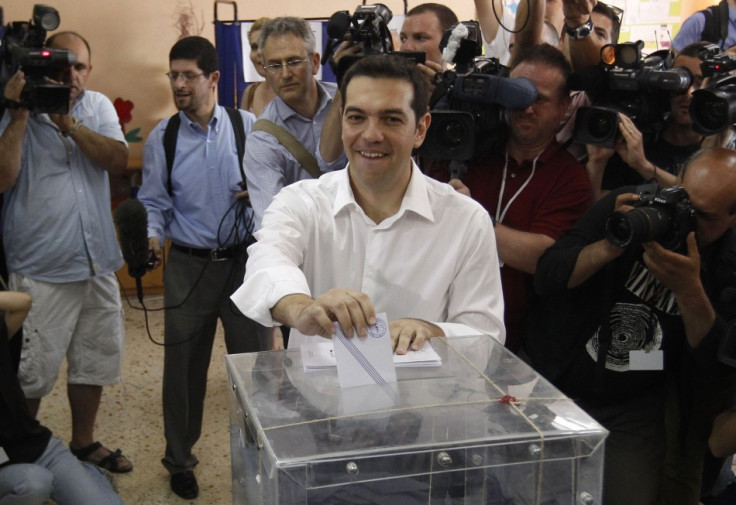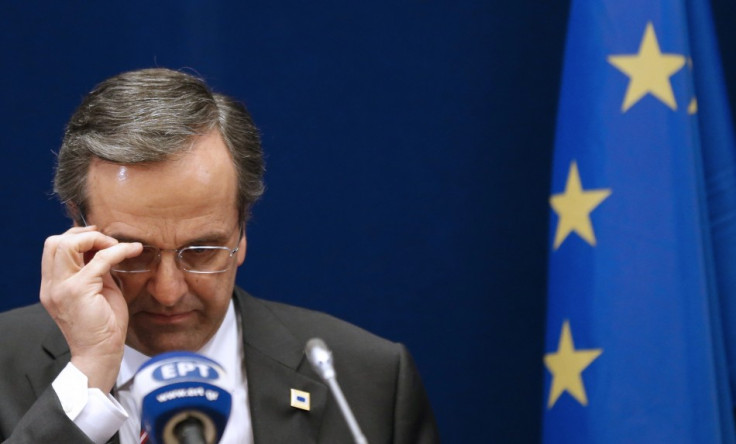Greece: The snap election that radical left party Syriza could win explained

Greece has been defined by political and economic turmoil since it sparked the eurozone sovereign debt crisis back in 2010.
Now Greeks face a snap election on 25 January with reports suggesting it will be a close-run battle between the incumbent conservatives and the radical left.
Why was a snap election called?
Under the Greek constitution, if the parliament cannot elect a president then a fresh general election must take place.
Antonis Samaras, Greek prime minister and leader of the conservative New Democracy party, was forced to call a new election after parliament failed to back his coalition government's presidential candidate, Stavros Dimas.
"People don't want these elections and they aren't necessary," Samaras said. "They are happening because of party self-interest."
Syriza, a radical-left Greek political party and the second largest in parliament, would not give its backing to Dimas. Others in parliament, including the neo-Nazi Golden Dawn party, also refused to back him.
Both have growing support in Greece. And Syriza - which some polls suggest is now the most popular party - could take control by forming a coalition with other far-left parties.
New Democracy and social democratic party Pasok were in coalition before the Greek parliament was dissolved ahead of the election, which will be the country's fourth since October 2009.
What did the Hellenic Parliament look like before it was dissolved?
There are 300 seats in total. New Democracy had 127 seats and its coalition partner Pasok had 28. Syriza had 71, the left-leaning Independent Democratic MPs 17, Golden Dawn 16, right-wing anti-austerity Independent Greeks 12, the Communist Party of Greece 12, Democratic Left nine, and eight independent members without a party.
What is at stake?
As Samaras put it: "This struggle will determine whether Greece stays in Europe."
That sounds a bit dramatic. Why?
It all goes back to the start of the eurozone crisis. Basically, before it joined the eurozone in the early 2000s, Greece hid how much public debt it had and how large its government deficit was so it could meet the standards needed for it to join the single currency area.
By 2010, when the financial crisis was rocking the world economy, Greece began to struggle. It fell into recession and the government could not afford to pay its bills because public spending had gotten so out of control.
For a lot of its spending, it relied on the bond markets. It would raise money by selling bonds to investors. When investors saw what was happening to the Greek economy, and the government came clean about the scale of its debt and deficit, investors lost faith in Greece.

This sent its borrowing costs sky-rocketing. Nobody was willing to lend to Greece unless it agreed to massive interest rates that the country could not afford. So it could not fund its spending commitments and was essentially bankrupt, sparking an economic depression.
In steps a troika of lenders to bail Greece out and rescue its economy. The European Union (EU), European Central Bank (ECB) and International Monetary Fund (IMF) all lent billions of euros to Greece in several tranches, totalling €240bn (£183bn, $276bn). Bondholders were also forced to take losses on some of their investments.
Strict conditions were attached to the troika loans. Greece had to reform its economy and drastically reduce public spending. This meant massive job losses, slashed public services and the withdrawal of fiscal stimulus for much of its government spending-reliant economy.
There was much public outrage and huge protests in streets. Austerity is hugely unpopular. While some Greeks grudgingly accept it as an economic necessity, others believe they are being punished for the wrongdoing of past governments and the financial sector.
From this anger, the Syriza party has built up a solid base of support. Left-wing Syriza, led by Alexis Tsipras, rejects the troika's loan terms, which it argues are far too punishing. It also promises to make public investments and increase government spending, something that has unsettled markets.
If the Greek economy collapses again, the troika is unlikely to step in. And there are concerns a Syriza victory would pull the rug out from the Greek economy.
If that happens, Greece may be forced to exit the eurozone to protect the other member states. And considering its membership of the EU its predicated on its membership of the euro, it may have to leave that too - especially if it can't repay its troika debt.
If Syriza believes in relaxing austerity, what does the New Democracy party believe in?
It falls into the category of grudging acceptors of austerity. It is trying to make the Greek public budget sustainable by slashing spending, privatising things and liberalising the economy. It has faced strikes and protests in response.
What about Golden Dawn?
Amid from the political and economic problems Greece suffers, it has seen a rise in support for the far-right. Golden Dawn has managed to win 16 of the 300 seats available in the Greek national parliament and it also has three members of the European Parliament.
The fascist party has been linked to anti-immigrant and racially motivated violence in Greece. It is also openly anti-Semitic and many members are Holocaust deniers. Its leader, Nikolaos Michaloliakos, is in jail awaiting trial for murder and extortion, among other charges.
Many Greeks fear Golden Dawn will add MPs in the snap election.
© Copyright IBTimes 2025. All rights reserved.






















